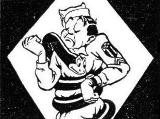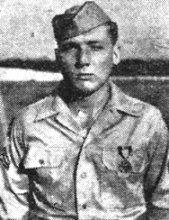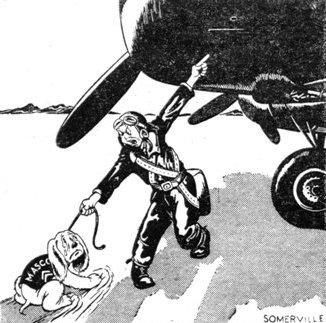|
To Burma In One Year
HQ., EASTERN AIR COMMAND - In the 12 months ending March 31, 1945, aircraft of the Eastern Air Command carried into Burma more than 550,000 tons of personnel and supplies, equivalent to the cargo of 55 Liberty ships, in the greatest sustained aerial supply operation in history.
Normal supply channels of ship, rail, and truck have not been available with the Burma combat fronts shut off by high mountains from the India supply bases, so C-46's and C-47's of Maj. Gen. Frederick W. Evans' Combat Cargo Task Force and Maj. Gen. Howard C. Davidson's Tenth Air Force Troop carrier and Combat Cargo units have carried on the Burma airlift to enable continuance of operations.
In January, February, and March, 1945, EAC transports lifted more than 250,000 tons, carried 236,000 persons and evacuated more than 70,000 men from forward areas. In addition, liaison pilots in their L-5's made more than 34,750 trips in March alone, flying out 8,450 casualties and transporting 461 tons of supplies.
Cargo carried has ranged from K-rations, ammunition and such items as darning needles to huge cranes, bulldozers, and disassembled locomotives. Some of the larger equipment was cut apart before loading, then welded back together at destination.
Tenth Air Force transports supplied Gen. Joseph W. Stilwell's Chinese, American and British troops during the Hukawng and Mogaung Valley campaigns and the siege of Myitkyina, and later delivered the goods to Lt. Gen. Dan I. Sultan's Northern Combat Area Command forces in the Bhamo and Lashio battles. R.A.F. Dakotas and USAAF C-47's of the Combat Cargo Task Force have handled aerial supply for the British 14th Army as it drove from Imphal to capture Mandalay and smash the Jap armies on the Burma Central Plain, and also for the 15th Corps troops in the Arakan.
The transports fly an average round trip of 500 miles, the distance from New York City to Columbus, Ohio, on their missions, usually without escort, facing the risks of enemy ground fire, fighter attack, severe monsoon weather conditions, and rugged mountainous or jungle terrain below. Approximately 80% of the tonnage is landed at forward airfields in Burma, the remainder is parachuted or free-dropped to frontline troops.
The hard-working aircraft, flown by USAAF, R.A.F. and R.C.A.F. crews, average 180 to 200 hours monthly. In March, 1945, EAC transports logged more than 83,000 hours in 53,000 trips, flying supplies into Burma at a rate equal to three trainloads daily.
EAC HEAVIES POUND JAPS IN BANGKOK
HQ., 14TH AIR FORCE, CHINA - Daring pilots of Maj. Gen. Claire Chennault's 14th Air Force this week braved heavy losses to sweep enemy-held airfields throughout occupied China, attacking 10 different airdromes to further cripple the Jap air units which have offered declining resistance of late.
Surprise attacks on the Shanghai field destroyed 32 enemy planes, with 16 more probables and one damaged in a two-day period. Totals for the week, which included attacks from Hainan Island to Laohokow, were 46 destroyed, 19 probable and 13 damaged. The 14th lost 27 airplanes.
Bombers and fighters raked large Jap troop concentrations in the Han River area northwest of Hankow, causing heavy casualties, and also destroyed more than 150 vehicles. Chinese Air Force P-40's and CACW planes joined in these attacks. Bombers bore down on rail lines, locomotives and bridges north of the Yellow River.
Missions of P-38's strafed Jap soldiers driving north from the Black River Valley in Indo-China against French troops battling south of Hanoi. P-51's furnished air support by hitting Jap positions at Phu Lang Thuong and Lang Son.
14th Hits At Rangoon In Meiktila Offensive, Oil Center Captured
British 14th Army troops have opened an offensive towards Rangoon and are driving south towards the seaport this week.
A two-week blackout on news from the Meiktila area was lifted and the position of the 14th troops was given as 75 miles south of the original airborne landing spot at Meiktila. The troops are operating in oppressive heat and in a country almost drained of water.
The British also captured Chauk, center of the Burma oilfields, while other units fanned out along the Irrawaddy and captured Singu, four miles north and Sale, eight miles south.
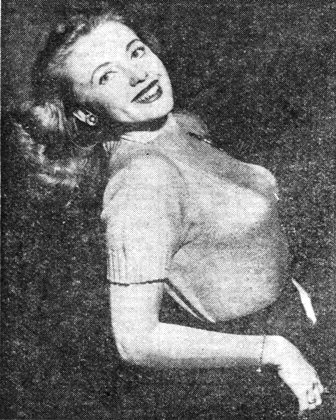 And she uses them to produce a voice that is broadcast over National Broadcasting Company. The gal is Martha
Stewart, singing star of RCA Victor.
And she uses them to produce a voice that is broadcast over National Broadcasting Company. The gal is Martha
Stewart, singing star of RCA Victor.
|
HON. SGT. BERRIGAN
WILL RETURN HERE;
QUITS ‘UP’ FOR ‘POST’
Roundup Staff Article
From "Butch" LaGuardia's reservation of New York the United Press informs Roundup this week that Darrell Berrigan, who covered the CBI when G.I.'s knew it as Confusion Beyond Imagination, has left its press association sweatshop and joined the New York Post as Far Eastern expert.
UP adds that Berrigan leaves for the Philippines June 1, will cover the Pacific warfare for a time, then expects to open up a branch of the Junior Red Cross at New Delhi or Calcutta. Interviewed in New Delhi, Poram, Berrigan's bearer stated, "United Press's loss is my gain."
HONORARY SERGEANT
Berrigan was made an honorary sergeant by Uncle Joe Stilwell for his long service in covering the Americans in this Theater. He was all through the Burma campaign and wrote the lead story for the first issue of the Roundup, on the initial night flight over The Hump.
He covered Merrill's Marauders, whom he called the "toughest bastards I have ever met" in the North Burma campaign. Later he returned to New Delhi where he held open house at No. 9 Wenger's Flats.
The place was generally jammed with Air Corps characters, jungle wallahs, and rear echelon commandos. When Berrigan came home at night he never knew whether he had a bed to sleep in or not. Finally Berrigan obtained a rubber mattress from the proceeds of a crap game and kept that handy for emergencies. In fact, it was a moot question as to which was more famous, No. 9 Wenger's Flats or 10 Downing Street.
KNOWN TO OLD-TIMERS
Berrigan is probably better known to old-timers around China, India and Burma than any other correspondent. He's been at about every air base in both Theaters. In fact an old tale goes when Berrigan used to arrive at an air base, tigers in the jungle would roar, "Berrigan's here, boys. Warm up the motors. We're going to have jingbao."
Honorable Sergeant Berrigan has been slaving at the United Press desk in New York for the past few months. There he acquired new face by financing sundry G.I.'s from various parts of this Theater, carrying on correspondence with wives, mothers, and kinsfolk of others still over here and assuring them their hopefuls were in good health and behaving.
TO ESCAPE JUKE BOXES
He came out to the Orient to get away from juke boxes. He left Los Angeles on a tramp steamer and joined the United Press in Shanghai. In Bangkok on Pearl Harbor Day, he fled to Burma where he covered the retreat. On that occasion he saw several Jap banzai charges from the wrong place (right in front of the Japanese).
Berrigan will still receive his mail care of United Press, New York. Born Aug. 3, 1914 at Yakima, Wash., he seems younger than his 30 years. He is extremely enthusiastic over (censored).
14th Supports Hunan Defense
HQ., 14TH AIR FORCE - Fighter and bombers of the 14th Air Force this week concentrated their efforts on aerial support of Chinese troops resisting the new Japanese drive west and northwest from the Paoching-Sinhwa-Sinning line in Hunan province.
Strafing attacks killed hundreds of Jap troops, destroyed tanks and motor vehicles, and set fire to storage dumps. P-47's exploded boxcars loaded with gasoline, while a total of 62 locomotives were destroyed or damaged during the week.
Chinese troops destroyed a small Jap force which pushed to within 65 miles of the 14th Air Force base at Chihkiang.
Other missions ranged all the way from north of Peiping to the Black River valley of Indo-China.
TWO KARACHI MEN VISIT MAHARAJAH
ASC BASE, KARACHI - When Pvt. Al Weinstein of New York and Pvt. Arnold Hahn of Worcester, mass., thumbed a ride with Miss Ruth Walker back in San Bernardino, Calif., a couple of years back, she casually remarked that if they ever got themselves shipped out to India they might look up her brother-in-law, H. H. The Maharajah of Indore.
The lads dismissed it as just conversation at the time, but we all know what happened, don't we? Two months later their transport docked amid classic cries of "Baksheesh, sahib," and recently the two boarded the train for Malik Bag Palace, Indore, and a week's stay with the Maharajah, who speaks of the U.S., where he has spent many months, as his "adopted country."
|
PAPER WORK MEMORY
LEFT BY AF SERGEANT
12TH BOMB GROUP HQS., INDIA - The complicated maze of paperwork encountered in war so frustrated Sgt. William Riek of Detroit, Mich., an ex-member of the Earthquakers' Materiel Section, that before being rotated to the U.S. early this year he sat down and sketched this Goldbergian version of a "wheel chart" to end all "wheel charts."
"Wheels, wheels, paperwork, paperwork," the sergeant used to moan every time he ran head-on into a stone wall of red tape. "It's a wonder a guy gets anything done." Thus, in his mind administration gradually assumed the proportions of a grotesque, distorted monster which ate up tons of mad effort - effort which finally, as he put it, culminated in a few weary bombs being dropped and one soldier of Nippon being snagged in the rear.
"Enemy intelligence looking at the complexities of our paper mill and its tremendous output must often wonder how we find any time to fight a war," he used to muse. "Little does he know it's the most-insidious type of secret weapon. We've probably got him too confused to fight back effectively."
Now follow the chart, starting at lower center with the squatting Indian heating his tea and at the same time generating the steam to start the wheels going. Note the subsequent din when the biggest wheel of all, S-1, begins to grind - bugles blowing, sirens screaming, guns shooting. Core of this wheel, naturally, is the ubiquitous latrine, from which pipelines radiate to all offices and sections. Carry on from here yourself, dear reader.
P.S. - Sgt. Riek still retained a few vestiges of sanity when he departed.

SONG OF THE INFANTRY VERSE 1: You may talk of ships and planes That ride the sky or ocean lanes And eight inch guns of coast artillery We're glad to give them credit But boy, don't you forget it We're the Doughboys of the fighting Infantry CHORUS: Where the going is the roughest And the battle is the toughest Johnny Doughboy's in the thick of all the din When it's hand to hand And man for man And with your bayonet and gun you lose or win We'll be in there every minute - When the war is won, we'll win it And lead the march on Hitler to Berlin. VERSE 2: We have slept in snow and mud We've seen our share of death and blood Our bravest are the cost of victory We know you won't forget them We pray that God may rest them They're the gold stars of the fighting Infantry. - CHAPLAIN Wm. S. BOWDERN APO 885 (Delhi). |
|
Dear Roundup: Franklin Delano Roosevelt, twice the savior of his country: first, in peace when he salvaged the wreckage of our economic system following the great depression; secondly, in leading our nation to the threshold of victory against the most diabolical military machine of all history.
He was the architect of world organization for peace and security; greatest American President since Lincoln, and, like Lincoln, died before the execution of his postwar projects in sight of the new world's dawning.
America and the democratic peoples of the world mourn the loss of our great leader and champion of human rights.
In the deep darkness of this tragic hour, let the nation be calm. Roosevelt's life was characterized by a profound faith in the people. Let the people now justify confidence by the utmost loyalty to his principles: The Roosevelt policies of the interdependence of world peace, democracy and prosperity; of Crimea; of Dumbarton Oaks; of Bretton Woods; of Chapultepec; of 60,000,000 postwar jobs for Americans; of an end to colonial domination and racial exclusiveness. Policies which convey the innermost aspirations of all mankind.
Our great President died at his post, the pilot was at the helm steering a true course through history's stormy sea. Let it be our resolve that no German or Japanese enemy shall long live to mock his death.
- T/5 James E. Jackson, Jr., APO 689 (Burma).
WAR MEMORIAL
Dear Roundup: Many cities of the world are now making plans for elaborate and expensive war memorials and statues.
Men and women in the armed forces of the world appreciate this gesture, but they do not agree with it wholeheartedly. Most of them have seen too much suffering, death and destruction to appreciate spending money on marble statues and memorial buildings. Those who have given their lives in this war, gave them so that the living could enjoy a better way of life and could learn to live in peace together. The eyes of the world are now turned to America, as a leader in the rehabilitation program that is to follow the cessation of hostilities. America cannot swing such a program alone, obviously, but she can introduce constructive suggestions.
It is suggested that on the great day of victory when all peoples of the world are celebrating the happy occasion, that each man and woman contribute what he may desire in money to be used for world child rehabilitation. This fund would be turned into supervised channels for the purpose of providing food, clothing and medical care for the millions of little children who have suffered so greatly in this world conflict. A child is a man's dearest possession. In what better way can we reach his heart than to help his child?
What better memorial could we give than the rehabilitation of the world's children.
- S/Sgt. Zeryl E. Jackson, APO 466 (Jorhat).
Ramgarh Chinese Say Last Farewell To FDR
RAMGARH TRAINING CENTER - In accordance with rites of an ancient culture, modified in this case to include the singing of The Star Spangled Banner in Mandarin, Chinese soldiers of this Chinese-American Training Center said farewell to the spirit of Franklin Delano Roosevelt.
As several thousand of China's American trained troops, drawn up at rigid attention, thrice bowed solemnly towards a flower-bedecked portrait of the late President, their commanding general, Maj. Gen. Chien Lih placed before the picture the foods, which, according to Chinese belief, the President's soul will need for sustenance during its trip to the next world.
3 MINUTES SILENCE
Then the troops stood with bowed heads and eyes shut for three minutes of silence in wordless tribute to a man whom they have regarded as one of the first friends of China.
The program opened with the singing of the Chinese national anthem. Then came the American anthem in Chinese sung by a picked chorus. Dedication of the food and of the floral tribute came next.
Then a Chinese private, selected by his comrades to represent them, set the tone of the verbal tributes which followed by chanting a Chinese memorial ode in classic Mandarin. The private, Chou Yu-fei, who speaks almost faultless English because of four years spent in Canada translated the ode for the benefit of U.S. personnel at the post:
ODE TO FDR
"On April 16th, in the 34th year of the Chinese Republic, the Commanding General of this Regiment and all officers and men honors the late President Roosevelt of the United States before his portrait, with incense and flowers.
"During this global confusion, devils with weapons and human-killers are at wild.
"People of the Allied nations, through their winning efforts have turned the tide, his leadership has saved the world from peril. The friendly relation between the United States and China is but one of his achievements.
"Why does heaven not keep this man for a few more years - why let loose this sad news all of a sudden?
"The four seas mourn with sorrow, while tranquility has not prevailed.
"While being too far away to attend his funeral I have only these few words to donate. Will not the President hear me in Heaven?"
SPEAKERS LISTED
Principal Chinese speakers of the remainder of the service were Gen. Chien, Lt. Morris Mah, son of an Ohio State University graduate, and one representative of each company of the regiment.
Responding for the United States were Col. Donald A. Young, Amherst, Mass., commanding officer of the Ramgarh Training Center, Col. Raymond R. Tourtillott of Lindsay, Calif., Ramgarh Chief of Operations and Col. Harry H. V. Ellis, Washington, D.C., Chief of Ramgarh Automotive Section under which the regiment received its training in the use and maintenance of American motorized equipment in preparation for service on the Stilwell Road.
|
XX BOMB G.I. SPEAKS
AT INDIA UNIVERSITIES
XX BOMBER COMMAND AIR DEPOT, INDIA - T/5 Lee Lorch, stock clerk in the XX Bomber Command's Air Depot and holder of a Ph.D. degree in mathematics, has given three invited lecture on Mathematics to Indian university groups since the beginning of his assignment in the I-B Theater.
Lorch's first lecture was at the University of Calcutta on "The Summability of Infinite Series." He was introduced by the Head of the Mathematics Department, Prof. F. W. Levi, who expressed his thanks "to Dr. Lorch for his willingness in accepting this invitation."
‘FRIENDLY FEELING’
In reply, Lorch said, "The honor and courtesy shown me are far more than I deserve personally, and I am pleased to accept them as indicative of the friendly feeling which mathematicians of India entertain for the mathematicians of America." He said, "I look forward to the extension of contacts between the two groups."
Lorch gave his latest talk at Dacca University, near Calcutta, on March 20. Among the audience were Dr. T. Vijayaraghavan, who lectured in the United States at the invitation of the American mathematical Society in 1936-37, and Dr. S. N. Bose, famous Indian physicist, noted for research done jointly with Prof. Albert Einstein.
U. OF CINCINNATI
Specializing in Fourier Series, a mathematical representation of wave motion, Lorch was, at the time he joined the Army, one of the relatively few U.S. mathematicians engaged in industrial research. He was awarded a doctorate of philosophy at the University of Cincinnati, where he was a research assistant. Prior to his enlistment, Lorch held the position of assistant mathematician for the National Advisory Committee on Aeronautics, a federal research agency, and also taught at the Hampton Institute, a leading Negro college.
Some of Lorch's research work has been printed in the Duke University Mathematical Journal. Another article on Fourier Series written during off-duty hours here in India, is being published in the Bulletin of the Calcutta Mathematical Society.
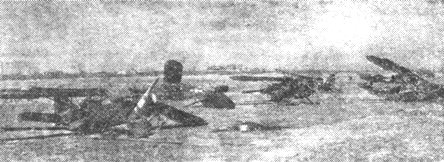
|
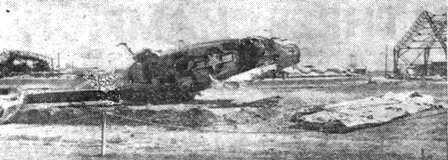
|
Miami Clip Joint Town Say Returned CBI-ers
Roundup Staff Article
The Roundup has been receiving verbal and written complaints lately about the treatment handed out by the citizens of Miami, Fla., to CBI-ers clearing the town on furlough and the consensus is summed up by one correspondent with, "A Serviceman needs to look into a mirror 24 hours a day or he'll be stabbed in the back."
To quote from one letter, "This place (Miami) is full of parasites and racketeers. I read a recent article in Collier's entitled 'Miami Beachhead,' which deals with the Miami 'patriots' and tells of their attitude in wartime. Needless to say, the article was far from flattering and I understand the local Chamber of Commerce has asked for a retraction. They have a fat chance of getting one in my opinion. If Collier's retracts the truth they can cancel my subscription."
STEAK $3.75
Another Theater man writes in to describe his chance at a Stateside steak, Miami style and Miami prices.
"The steak cost me $3.75. French fries cost me six bits extra and salad was a buck, six bits more. I stopped in a night club for a drink which set me back 80 cents. The waiters here all have grabbing hands. Before I had half finished the drink one of the waiters had grabbed it away and was hanging around for another order. One more night of this Miami hospitality and I'll think the Indian jewel wallahs are all honest Johns."
Another complaint tells of the friendly cab drivers in Miami.
MUST HEAR JINGLE
"They won't let you get in the cab until they first find out where you want to go. Unless its quite a ways and will make the meter do plenty of ticking they will disappear in a cloud of exhaust, right in your face. If they figure you're no good for a tip, they'll ignore you, Enlisted men are regarded by cab drivers as not even worthy to stop. Even trying to ask one of those guys for directions is a waste of breath. They'll hardly bother to answer you unless they hear the jingle of coins."
The next complaint is verbal and brought back by a returnee from a furlough. He went out to play golf. He was rented a set of clubs, total value estimated at about seven bucks, for $1. He went to the clubhouse and bought a coke which cost him 20 cents. "They get three glasses out of a bottle that costs them three cents. Pure patriotism as practiced in Miami."
BLACK MARKET
Another Serviceman told of the difficulty he had getting accommodations for his wife to return home from Miami, where she was seeing him off to India. "They have a seemingly unlimited black market there. Speculators send their stooges into the reservation line 15 to 20 at a time, to buy tickets. Then they resell them a very, very profitable prices. Servicemen are a good market since they have little leisure time.
The same Serviceman told us of another phase of Miami hospitality. "Another fellow and myself were waiting for a bus. It was a residential area and traffic wasn't very heavy. About 35 cars passed us while we were waiting for the bus. Most of the cars had plenty of room. Do you think any of those 'patriots' would stop and offer us a lift. Of course not."
LOOK AT NEW YORK
Just for contrast to the fabled, and evidently strictly fictional Miami hospitality, we present an extract of a letter from another former CBI-er, in which he tells about the cold and heartless city of New York. Just for the record we might mention the writer is from the West Coast and not from New York.
"The people of New York are wonderful to Servicemen. The taxi drivers will pass up civilians to pick you up and they don't overcharge you. Most of the drivers have kids and friends overseas and they are very friendly and helpful. To say nothing of the New York cops, who will answer any questions about anything, with a lot of friendly advice.
‘WELCOME HOME’
"I had a hard time getting a hotel room. I called two hotels and no room. Finally on the third call a lady asked me, 'Are you in the Army?' When I told her 'yes' she then asked, 'Are you just getting home?' I again told her 'yes.' She then gave me a number to call and said, 'They will take care of you.' I wound up with a fine room and at two bucks less than that charged civilians.
"Incidentally, the first words spoken to me over the phone when I called the latter number were, 'Welcome home. We're glad you are back. Just where would you like to stay?'
"I'm still a West Coast rooter. But believe me, the people of New York cannot be libeled in my presence. They certainly treat Servicemen as if we were chosen people."
There it is, boys. A study in contrast.
|
Sultan Encourages
Bond Drive Saving
Announcement of the Seventh War Loan Drive was made this week in a letter from Lt. Gen. Dan I. Sultan, Theater Commander, to all United States Forces operating in the India-Burma Theater.
The drive, with a national quota of $14,000,000,000 to be raised, of which $7,000,000,000 is to come from individuals, opened April 9th and is to continue three months through July 7th.
Active support of the military establishment both at home and overseas is being enlisted.
Gen. Sultan in his letter encourages all personnel to participate in the drive.
"Each officer, soldier and civilian must prepare for the peacetime adjustment by building up financial reserves now," he warns. "Each officer and enlisted member of the Army who can possibly do so should initiate a Class B allotment or increase the one now in effect, as a policy of sound personal investment."
To those who have excess funds on hand, he urges that some of it be used "to purchase war bonds for cash, thus putting the cash to work for the future and preventing its dissipation in the present."
10TH AIR FORCE USING P-61 PLANE IN THEATER
HQ., 10TH AIR FORCE, BURMA - Presence of the P-61 Black Widow in the India-Burma Theater has been officially announced by the 10th Air Force.
During the past months, this deadly night fighter, operating under a blanket of security restrictions, has practically wiped out all nocturnal Jap raiders from Burma skies. Today, for lack of its particular type of target, the Black Widow has been transformed into a fighter-bomber, blasting retreating enemy forces with 500-pound bombs.
ACHIEVES SURPRISE
With its twin engines and twin tails, the Black Widow resembles the P-38 Lightning although much heavier and carrying a three-man crew - pilot, observer and crew chief. Its climbing power, tremendous speed and special radio detection equipment enables the P-61 to achieve great tactical surprise on enemy aircraft.
The 10th Air Force's Black Widow squadron is commanded by Lt. Col. James S. Michael, veteran of North Africa and Italy campaigns. His operations officer is Maj. Thomas N. Wilson.
STORCK FLIGHT LEADER
Capt. Walter A. Storck, who, at 38, is probably one of the oldest active fighter pilots in the service, is flight leader of the Black Widows. In the past 16 years, Storck has accumulated more than 6,000 hours in the air, flying everything from an L-5 liaison plane to the newest jet-propelled aircraft.
|
I-B G.I.’S ‘WONDERFUL’
SAYS OUR TONI SEVEN
NEW YORK - (UP) - Luscious, photogenic Toni Seven, her heart and pen flowing with gratitude, this week wrote a letter to all of her "friends in the China and India-Burma Theaters," who have flooded her mail box with requests for pinup pictures.
Miss Seven wrote: "Thanks to the United Press I can now answer 1,034 letters I've received from all of you, my new wonderful friends out in CBI. It was the greatest thrill of my life when I received a letter from you, advising me that I was named 'Sweetheart of G.I.'s,' and to each and every one of you I send my deepest thanks.
HEARS FROM BRASS
"I want you to know that all the good things you have written have gone to my heart and not to my head. The pinups will keep going to you as fast as I can make them and as often as you ask for them.
"Since the story came out that some brass hats ordered my pictures down because they were proving a distracting influence to the war effort, I have received hundreds of letters from other officers asking for pinups. So you can see a great deal of brass is coming my way these days, and I think we should let them in our pinup organization, don't you?
PICTURES TO ALL
"But don't think I am fickle. My heart is with the G.I.'s.
"It has been impossible to answer all of your letters, but you may rest assured autographed photographs are on the way to everyone who wrote. If you'll keep writing, I'll keep sending photos. And if the United Press will permit, I'll keep writing.
"With all good wishes, Toni Seven."
B-25 DROPS SEWING KITS OVER BURMA
HQ., EASTERN AIR COMMAND - Mitchells of the 12th Bombardment Group don't always drop bombs on Burma. Sometimes they drop pamphlets. And - nowadays, at least - one B-25 is dropping sewing kits as well.
The idea came to an American officer, Lyon G. Abbot of Durant, Okla., one afternoon when he was pondering the plight of the Burmese, who, after three years of Japanese occupation, were suffering from a shortage of clothing.
To help them keep what they have in repair until the economy of the country is restored, he decided to send them mending kits as well as reading matter.
Abbot arranged for a single plane mission over some selected Burmese villages. With Capt. Sidney R. Mandin, Shreveport, La., as pilot, and Lt. Thomas J. Rhinelander of New York City, as navigator, the plane set out and dropped leaflets, thread and needles.
"While we had to fly hundreds of miles to make the right distribution," Capt. Mandin said, "we think it was well worth our while. These presents should help make the villagers feel friendly toward us."
Stratemeyer's Chief Of Staff Gets Promotion
HQ., EASTERN AIR COMMAND - Promotion to the rank of major general of Brig. Gen. Charles B. Stone III, Chief of Air Staff for the Army Air Forces in India-Burma, and of the Eastern Air Command, has been announced by the War Department.
Gen. Stone was a colonel when he was appointed as Chief of Staff to Maj. Gen. George E. Stratemeyer's command on Sept. 11, 1943.
He was promoted to brigadier general Nov. 11, 1943. He was graduated from the U.S. Military Academy at West Point in 1927, as a second lieutenant, Infantry. He is also a graduate of the Air Corps Tactical School.
After completing his flying training in 1930, Gen. Stone held assignments with the Army Air Forces at Cahnute, March and Hamilton Fields. He later spent 20 months as base engineering officer at Luke Field, Hawaii. Afterwards he was assigned to Air Service Command at Wright Field, Ohio.
Gen. Stone holds the AAF rating of command pilot and aircraft observer. His decorations include the Bronze Star Medal.
Powerized Hacksaw Shows Inventiveness Of Two XX Bomb Men
XX BOMBER COMMAND DEPOT, INDIA - Two enterprising members of the Ordnance section here have displayed typical American inventiveness by creating from spare parts a power-driven hacksaw which in 25 minutes can saw up a brass bar that formerly required a full day's work by hand.
Sgt. Charles R. Dare of Mt. Vernon, Ill., and Cpl. Alfred V. Kubici of Colden, N.Y., utilized a scrap metal base and stand, a second-hand electric motor and gears from a discarded hoisting device in rigging up the machine which weighs approximately 300 pounds and has an estimated value of $35. Similar factory-made machines cost from $400 to $1,500.
Not only does the new saw make 40 to 45 cuts per minute, but it gives a smooth, straight cut which makes unnecessary the additional machining formerly required when the bars were hand cut. Metal filings are salvaged.
Dare and Kubici are now working on plans for modifying the saw to improve its efficiency and safeguard against accidents.
|
AIR SERVICE COMMAND BASE, INDIA - The guide books say, "If a snake crawls onto your body, freeze in your tracks! The snake will not harm you and will soon go away."
Cpl. Pleasant C. Templeton, photo lab wallah of an Air Service Group, had the unpleasant opportunity to test this theory while on guard duty one recent night.
Stooping over to avert the icy wind and blinding rain of the winter monsoon, Templeton felt a "sizeable" snake creep up into his lap. Remembering the advice, he remained perfectly still while the reptile playfully investigated such curiosities as his luminous-dial wrist watch and shiny overcoat buttons.
Friend snake apparently had read the same guide book and behaved accordingly. Fifteen minutes later, he wriggled off into the grass. Templeton still can't comb down his hair. - Cpl. RAY LOWERY.
COM-CAR HAS HOTTEST BAND IN THE LAND
HQ., TENTH AIR FORCE IN BURMA - "The Assam Chamber Music Society," a product of a Tenth Air Force Combat Cargo Squadron, claims to be the "hottest band in the India-Burma Theater."
Led by Lt. Glenn Kemp, of Atmore, Ala., the band has been acclaimed by thousands who have heard them beat out the best jive in Assam.
Kemp, a Combat Cargo pilot who swings it out on the trumpet, has more trouble keeping his band together than do most of the big name outfits in the United States. The trouble started when the drummer, Lt. Anthony DeVito, was wounded by enemy fighters over Burma and was hospitalized. He was replaced by Lt. Don Widgerson, Madison, Wis., who now has taken possession of the drums.
TRANSFERS INTERFERE
Transfers, rotation, rest leaves, and temperament have all helped plague band leader Kemp during the last ten months. However, by means fair or foul, he always manages to keep a jive combination together.
Popular, classical, and even hillbilly music are all in the repertoire of the Chamber Music Society. Instruments are rather difficult to obtain, but with the aid of various Army organizations, the purchasing of Indian-made instruments and by begging and borrowing, the band has acquired a good variety.
PLAY AFTER COMBAT
An Assam party is not considered complete without its rhythm. Most remarkable is the fact that some of the musicians are flight crew members who often play after ten or twelve hours of combat flying.
Feature of the G.I.-Officer combination is a jam session that winds up every evening of entertainment. The Assam tea-patches reverberate to the music when the airmen start to beat it out.
EAC Transports Locomotives Up Forward
landing heavily loaded USAAF C-87 transports carrying dismantled locomotives on front-line air strips that were still within range of Japanese artillery fire was one of the many dangerous operations recently faced by pilots of Maj. Gen. George E. Stratemeyer's Eastern Air Command.
Railroad locomotives were badly needed by Allied ground troops to establish supply routes in forward territory captured from the Japanese. Because of the mountainous territory and lack of good roads between India and Burma, the only way to get switch engines to the points where they were needed was to transport them by air.
SIX ENGINES CARRIED
Six American-made engines were dismantled and crated at a civilian railroad shop in Calcutta, India. The heavy parts of the locomotives, some weighing as much as 1,700 pounds, were hauled to a nearby airport and loaded into a U.S. Army Air Force transport plane.
Everything was against the landing of the large aircraft with safety. Lt. Col. Payne Jennings, and Lt. Frank L. Gurney of the Seventh Bomb Group brought the transport in on a forward airstrip without mishap but had a good many close shaves before the plane finally rolled to a stop.
STRIP TOO SHORT
To begin with the strip was too short for a safe landing. It lacked by almost 2,000 feet the length these four-engine transports normally require and it was still within range of Japanese guns. The heavily loaded plane bounced and rocked over the soft sand that had been hastily scraped into old bomb craters and the ditches dug by the retreating Japanese.
Another of the six engines was taken into a similar air strip by two other pilots of the Seventh Bomb Group.
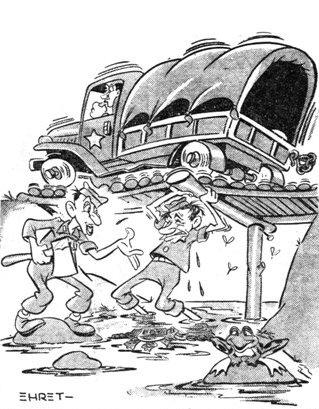 "Of course you understand Elleta, this is only temporary."
"Of course you understand Elleta, this is only temporary."
|
NEGRO MP PLATOON FOR I-B THEATER
The first all-Negro Military Police platoon in the India-Burma Theater has been authorized by the War Department "to improve control and increase understanding among Negro troops," Lt. Col. Charles Meyers, acting Theater provost Marshal, announced this week.
The new platoon, composed of one officer and 60 enlisted men will serve in the Ledo and Calcutta areas. Members will be picked from units already in the Theater, with preference given those with M.P. service back in the States or who have had civilian police experience.
NEGRO DRIVERS CITED BY ASC FOR MERIT
EASTERN AIR DEPOT - The Petrol patters, Negro trucking company of this Air Service Command base, were recently awarded the Meritorious Service Unit plaque "for superior performance of duty in the execution of exceptionally difficult tasks and for achievement and maintenance of a high standard of discipline during the period March 20, 1944 to May 20, 1944," according to general orders issued by the I-B Air Service Command.
One of the two Air Corps trucking companies operating in Upper Assam during the drive on Myitkyina, the Petrol patters were cited for their work in supplying troops in advanced areas.
on one occasion, in addition to regular transportation duties, they made a 250-mile drive over a monsoon-swept, one-way-traffic trail in 20 hours without breakdown or accident to deliver vitally needed bombs to a forward area. Cooks, supply men and clerks took their turn behind the wheel during this haul.
Besides their supply-carrying performance, the unit also has an enviable record for military discipline. It is one of the oldest trucking companies in the Theater and spent a year on the Ledo Road, now a part of the Stilwell Road to China.
Lt. Michael R. Joseph is present CO of the outfit, all of whose original members have returned to the U.S. on rotation. Two men, T/4 Alvin Odom and Sgt. Eddie Wilson, are returning to the Theater after taking temporary duty in America, however.
G.I. ENGINEER PUTS “FREEZE” ON RAMGARH
by T/4 HENRY McCANCE
RAMGARH TRAINING CENTER, INDIA - Meet the Ice King of the tropics:
At least that is what the G.I.'s at this Chinese-American Training Center, commanded by Col. Donald A. Young of Boston, Mass., are calling T/4 Lester C. Shuholm, 32-year-old former Portland, ore., refrigeration engineer.
Shuholm, who has been in the business of building refrigeration units since 1932 in his home city and kept it right up during his Army career, gets the title crown from his wizard-like knack for turning spare parts and odds and ends of scrap metals into capacity producing ice plants.
He's a particular hero to the Servicemen here, who during the sizzling heat of an early Indian summer can stampede post canteens for frosty cokes and ice cream sodas with absolute assurance that Shuholm, as long as he's on the job, won't disappoint them. And the chances are that Portland's gift to the India-Burma Theater will have plenty of ice on hand even after the cokes and ice cream mix run out.
Today, eight months after the project was started, the uncompleted plant is freezing four and one-half tons of ice every twenty four hours, going night and day and keeping ahead of requirements as the temperatures continue to soar.
"We'll have more than enough for everyone this summer," the Portland engineer promises, as he shows visitors through two spacious cooling rooms where temperatures are as low as 20 degrees are maintained for huge supplies of meat and vegetables.
A backlog of approximately 17 tons of ice can be stored in one of them.

By SGT. CHARLES W. CLARK Roundup Staff Writer There's one more little item," Levinthal adds, "a good stiff wire running through the center of the rope seems to help a lot." Complaints of "no T/O" fall on unsympathetic ears when talking to Lt. Col. John L. Grimes, Adjutant General of the Northern Air Service Command in Assam. To those "bucking for another stripe" grimes likes to tell of how he once waisted 13 years (from 1922 to 1935) to go from T/Sergeant to M/Sergeant. "In those days," he'll tell you, "T/O's were really tight. You had to wait till someone died to get promoted. Today the fellas have a cinch." Bearing out Grimes' last statement is the meteoric rise of one M/Sgt. James M. Demulling, personnel clerk for the Combat Cargo task Force. Last March 2, Demulling made staff sergeant; nine days later, tech sergeant; and on March 21, he was upped to master. Col. Elmer E. Elmer, teddy bear mascot of B-29 Deacon's Disciples, XX Bomber Command, now has a girl friend. Elmer recently received a letter from Elmira Panda, Detroit, Mich., in which Elmira described herself as a "panda bear with big, brown eyes and slightly on the chubby side." Elmira coyly pointed out that "every man overseas has a sweetheart" and wanted to know if she could write to him occasionally. Elmer doesn't know if it's the uniform or the allotment check. S/Sgt. Andrew J. Dudash declares he's never been a hog caller or train caller, but nevertheless it was his loud mouth that recently saved a downed aircrew in the Burma jungles. When the ground rescue party failed to understand his signals from the air, Dudash - a liaison pilot with the 10th Air Force - cut the throttle completely and while his tiny plane silently glided at tree-top level, he shouted instructions to the rescuers.
|
835th Signal Does Varied Tasks During Past Three Years In CBI
The officers and men of the 835th Signal Battalion, those who have been rotated home and those who still remaining in the far stretches of the present India-Burma and China Theaters, are convinced of one thing - crossed flags mean that you may be called upon to service anything from an electric toaster to a radio station.
The 835th is one of the pioneer outfits of the old CBI. This month the personnel celebrated their second anniversary since being designated as a battalion.
The story actually starts back in February, 1942, when the 835th Signal Service Company was activated in Washington. Capt. W. A. Muir was designated as CO. The objective of he and his men: to set up communications in the Orient.
INTRODUCTION TO INDIA
The men docked at Karachi, India, on March 12, 1942. A G.I. heaved a roll of toilet paper to an Indian on the dock. Then he amazedly watched as the recipient fashioned a turban. That was their introduction to the CBI. The Indian ingenuity was to pale into insignificance before what the men would be called upon to fashion in the future to carry forward the lines of communication against the enemy.
One unit was sent to the Ramgarh Training Center, where "Uncle Joe" Stilwell was to fashion the Chinese divisions that drove the Japs out of North Burma. At that time Ramgarh was designated as a POW camp.
This situation became complicated when Sgt. Thomas Beckner cabled a birthday greeting to his mother. The post censor marked the message with a POW stamp. Beckner's mother contacted the War Department to find when and how her off-spring had been taken prisoner. Soon after, the POW camp officially became known as Camp Ramgarh.
INGENUITY PAYS
When the Chinese troops came in from the Burma retreat the Signal wallahs met them at the station. The only U.S. troops in the area, they acted as guides, Ordnance, Quartermaster and Engineers for the Chinese. They even were asked to build flagpoles.
The explanation for the latter was very simple and a tribute to Oriental ingenuity. The Chinese figured that an antenna was part of a radio station. A radio station was the responsibility of Signal. A flagpole and an antenna were similar. Therefore building a flagpole was the responsibility of Signal. Faced with such masterly logic the Signal wallahs capitulated.
The flagpole requests mounted. Each new request asked for an additional foot and the men learned what was meant by "face." When their own flag arrived they erected a supermast in front of their own headquarters. But soon the Chinese persuaded a recently arrived Engineer outfit to erect even a higher pole.
CONFUSION
The Americans also lent the Chinese their equipment a few hours each night to clear messages to Chungking. This caused an aspirin deluge for stand-by operators at rear echelons, who were monitoring the net, as the Chinese had their own version of the International Code.
As additional American troops arrived in the Theater communications problems multiplied. Necessary liaison with Chungking, Delhi and Assam sent the volume of traffic up. The Ramgarh detachment generator, overloaded, caused trouble. Only limited frequencies were available.
All over the Theater men of the 835th were meeting the same difficulty. From Karachi a unit had contacted Washington. A set was installed in a discarded P-40 crate on the edge of the Sind Desert. The beam passed over Berlin and the North Pole. Polar disturbances cut transmission to a few hours a day. To eliminate this trouble a team of the 835th was rushed to Eritrea and a relay station was built there. This was in early 1942.
By the middle of that year teams of the 835th were scattered all over the Theater. They were in Kunming, June, 1942, working in slit trenches and foxholes on the edge of the air field there. The transmitter was a homemade job. It quit the first week. They tore it apart and rebuilt it. It didn't quit again. It was still in use in 1944.
WITH STILWELL
The first Army transmitter used in Chungking came out of Burma on the retreat. The personnel were caught in a Jap drive, but flown out on a transport plane. Others walked out with Stilwell.
Maj. Gen. Frank Merrill, Deputy Theater Commander, remembers the Burma show. It was at Shwebo, the last point here. "We got the hell licked out of us, and retreat was the only answer. I was given two enlisted men to find a way to walk out. Those two men were members of the 835th," says Merrill.
IN ASSAM
In June, 1942, the 835th men in Assam were doing communications the hard way in conjunction with their other brethren in advanced units in the Theater. They weren't pole lineman, but they built pole lines. They hung 20 or 30 pair of field wire on single bamboo poles and for a line truck they used an elephant. Shades of basic training.
Another 835th team was in Ledo, December, 1942, when construction began on the Ledo Road. The radio men hauled a radio transmitter up a hill so steep they had to use block and tackle. The wire men built the first 37 miles of pole line along the Road. The men handled all communication in the area, both radio and wire. They ran message centers and code rooms and supply dumps all along the way.
The CBI grew up and the 835th grew with it, becoming activated as a battalion in April, 1943. Communication became big time. Modern equipment was installed upon arrival.
Before the old-timers left for the States after more than three years overseas, they knew that their outfit was back in Burma again. While the Japs were still at the far end of the air strip in Myitkyina, an 835th radio station went on the air.
The 835th has serviced radios, repaired refrigerators, erected flagpoles, about everything even remotely connected with Signal work. But the men of the 835th have, and still are, making communication history in the Orient.
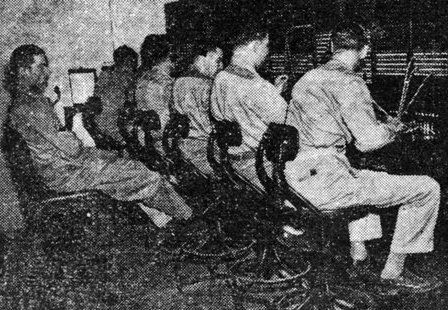
|
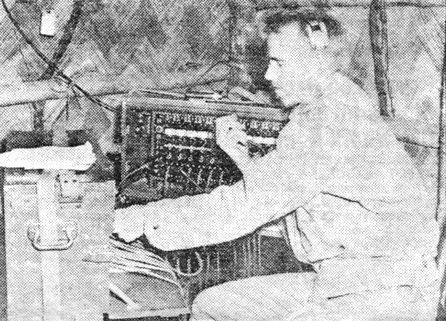
|
In left photo, 835th telephone operators shown at work on a commercial type, six-position switchboard are (left to right): T/3 Robert Beach, Felicity, O.; T/4 Richard Maxfield, Salt Lake City; T/4 Leo Lefebyre, Woonsocket, R.I.; T/5 Edward Kellan, Sterling, Colo.; T/5 Wilbur Davidson, Parkersburg, W.Va.; T/5 James Hawkinberry, Fairmount, W. Va.; and T/5 Arthur Meyers, St. Louis. In right photo, T/5 Stanley E. Nelson, of Chicago, operates one of the many Field Telephone switchboards installed by the 835th along the Ledo Road.
|
‘ANTS IN THE PANTS’ IN CALCUTTA PHONES
CALCUTTA - If you want ants by the millions, headquarters of Base Section No. 2, SOS, has them in the strangest place - in the telephones. When a telephone goes dead in the headquarters, Sgt. Paul Wagner of Atlantic City, N.J., signal center wire chief, will offer 10 to 1 odds that the trouble is ants. Wagner disassembles the phones and goes after the ants with aerosol bombs. For which activity some wag has tacked another sign on his desk, "Bug Exterminator." |
|
GREAT TRAGEDY
LOUISVILLE, KY. - (UP) - Capt. Arthur Allen, Jr., packed his baggage full of Oriental souvenirs when returning on leave to his home in Louisville after more than a year in China, Burma and India. He brought the curios half way around the world by ship and plane for the home folks - then lost them on a train in the U.S. |
|
But Same Old Stories
by S/Sgt. KARL PETERSON Roundup Staff Writer
As official newspaper of the India-Burma Theater, it is the Roundup's privilege and pleasure to publicize the accomplishments of American troops out here; stories of heroism in combat, both by ground units braving the perils and discomforts of the jungle and Air Force crews smashing the enemy despite inadequate facilities and the treacherous weather of the monsoon; stories of dogged effort to move great quantities of needed supplies or establish communications over rugged terrain; stories of improvisation by Yanks who manufacture that which they lack from what they have, and finally human stories of the way Americans live and play, when they can, while sweating it out in the Orient to carry the fight to Japan.
GO UNHERALDED
Yet inevitably in wartime news values decline. Stories of daring and accomplishment, of high courage and amazing escapes from death, are being enacted daily on so many fronts, until men who be peacetime standards would be journalistic sensations sometime have their feats go unheralded in the whirl of gaudy, incredible events that make up the day-to-day story of a global war.
Many a newspaperman has at some time or other the feeling that all the stories have already been written, that each new item is only an old story with new characters, and such has been the case with us. Without cynicism, and retaining an appreciation of the accomplishments mentioned, Roundup's editors have nonetheless found that their stories fall into an oft-repeated pattern, and may be forgiven if they occasionally wish wistfully for new angles, for "man bites dog" variations of the old familiar themes.
FOND DREAM
Thus it is a fond dream around the editorial sanctum that someone will ones day forward the story of an Air Force crew whose mascot dog, monkey or bear cub, does not have 75 missions to its credit, in fact dislikes flying intensely and gets deathly airsick from the moment of take-off.
Loud would be our cheers for an interview with a G.I. in Burma who went tiger hunting, spotted a huge cat, fired - and missed completely, the quarry escaping into the bush. But instead our keen-eyed nimrods all seem to bring home the kitty, forwarding a shot-by-shot account of the kill, complete with pictures of the trophy.
If some I-B'er would receive one of those long-in-transit Christmas packages, the kind dated from the previous year, which contained candy and cakes all in excellent edible condition, it would rate a three-column spread. Rather we must knock ourselves out with descriptions of conglomerated carmels and cookies, in high odor, that emerge from the unwrapped gift parcel.
NEVER MET
A sensational feature, if ever uncovered, would be an account running something like this: "Yep, it's quite a coincidence. My brother Joe and I have been in the Army for three years and we never met in India. In fact, we never got closer together than Calcutta and California. It's remarkable."
Our chief mail-reader would undoubtedly swoon with joy if anyone should ever break with tradition to write us: "I want to congratulate you on accurate reporting on your stories about the QM fresh meat supply program and the special service ice cream factory. Sure enough, our outfit is receiving both items, a most welcome addition to our mess."
Or picture our surprise if some character requested that we write the story of the part another outfit played on a joint project. Something like: "It's true that our unit strung most of that wire-line, but I think you should mention the 4358th Signal boys, whose post-hole digger we borrowed." Buddy, that would be the millennium.
FUTURE ISSUE
In some future issue we long to run the picture of a general who never pinned any decorations on anybody, and another of the pilot who bailed out and landed right in an Allied encampment, never had to walk a step to return to safety and civilization.
But our real pet is the mythical mechanic whom we have dubbed Pfc. Stupe, who, when interviewed by our ace agent, T/7 Osmosis Fink, will publicly state "Ingenuity? Naw, I never invented nuthin.' Just use my regular tools; if I an't got something, to heck with it." Ol' Stupe shows a mighty poor attitude, we agree, but boy, what a news angle!
The Roundup is a weekly newspaper of the United States Forces, published by and for the men in Burma and India, from news and pictures supplied by staff members, soldier correspondents, United Press, OWI, and Army News Service. The Roundup is published Thursday of each week and is printed by The Statesman in New Delhi and Calcutta, India. Editorial matter should be sent directly to Capt. Floyd Walter, Hq., U.S.F., I.B.T., New Delhi, India, and should arrive not later than Sunday in order to be included in that week's issue. Pictures must arrive by Saturday and must be negatives or enlargements. Stories should contain full name and organization of sender. Complaints about circulation should be sent directly to Lt. S.R. Rose, Hq., U.S.F., I.B.T., New Delhi, India. Units on mailing list should make notification of major change in personnel strength or any change of APO.

|
APRIL 26, 1945
Adapted from the original issue of India-Burma Theater Roundup shared by Linda James
Copyright © 2009 Carl Warren Weidenburner
TOP OF PAGE PRINT THIS PAGE ABOUT THIS PAGE SEND COMMENTS
PREVIOUS ISSUE CLOSE THIS WINDOW NEXT ISSUE
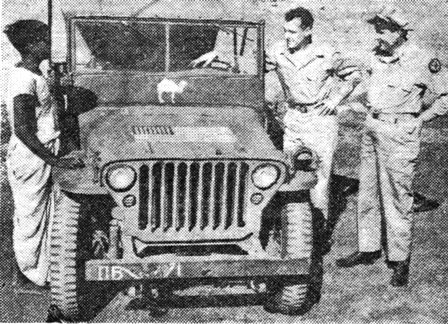 Lt. Col. Ainsley E. Stuart and Capt. Norbert R. Killam look in appreciation at their rugged little jeep that carried
them all over treacherous mountain trails in China. The jeep was flown over the Hump in a B-29 for use in a B-29
salvage expedition. The American flag was painted on the jeep to identify the mission to Allied airmen and the
camel to credit the jeep with one round trip over the Hump.
Lt. Col. Ainsley E. Stuart and Capt. Norbert R. Killam look in appreciation at their rugged little jeep that carried
them all over treacherous mountain trails in China. The jeep was flown over the Hump in a B-29 for use in a B-29
salvage expedition. The American flag was painted on the jeep to identify the mission to Allied airmen and the
camel to credit the jeep with one round trip over the Hump.
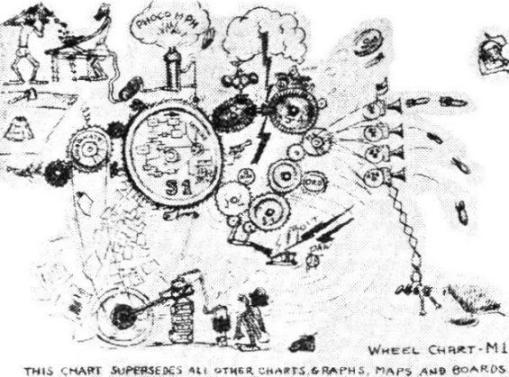

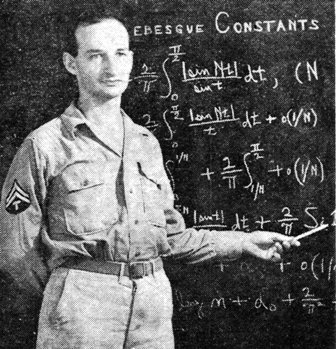 T/5 Lee Lorch, Ph.D., and quite a wizard in mathematics, takes time off from his stock clerk's job with the XX Bomber
Command to lecture the University of Calcutta on the "Summability of Infinite Series," which has nothing to do with
adding up discharge points.
T/5 Lee Lorch, Ph.D., and quite a wizard in mathematics, takes time off from his stock clerk's job with the XX Bomber
Command to lecture the University of Calcutta on the "Summability of Infinite Series," which has nothing to do with
adding up discharge points.
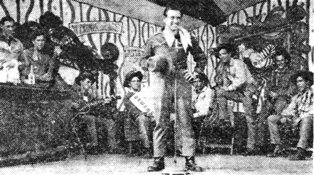 T/5 Earle Paul, singing star of the Entertainment Production Unit's western musical, Rhythm Roundup, explains
just what the show is all about. The musical is now playing to G.I. audiences throughout India-Burma.
T/5 Earle Paul, singing star of the Entertainment Production Unit's western musical, Rhythm Roundup, explains
just what the show is all about. The musical is now playing to G.I. audiences throughout India-Burma.
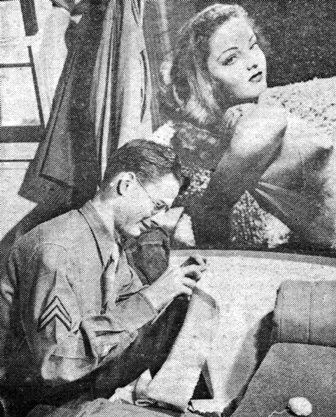 Movie Actress June Millarde, better known as Toni Seven, has received more than 1,000 requests for cheesecake picture from Roundup readers following a story we ran recently. Here a certain Cpl. Don MacFarlane, Denver, Colo., knits a sweater for Toni. Ah, those press agents.
Movie Actress June Millarde, better known as Toni Seven, has received more than 1,000 requests for cheesecake picture from Roundup readers following a story we ran recently. Here a certain Cpl. Don MacFarlane, Denver, Colo., knits a sweater for Toni. Ah, those press agents.
